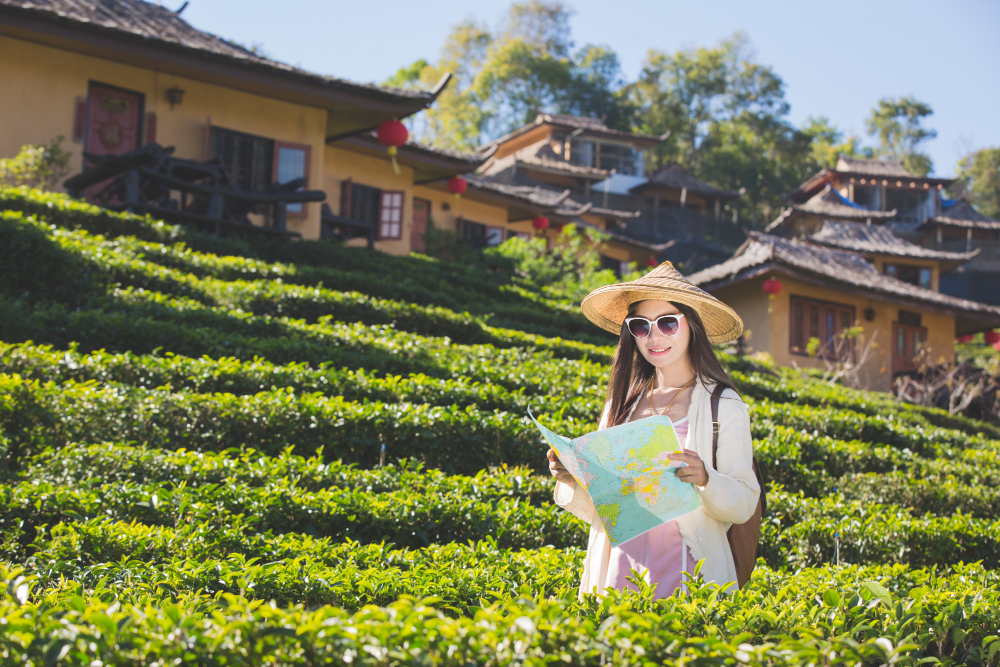A tiny but growing part of the travel business, coffee tourism gives coffee fans a close look at coffee’s start, growth, and culture. Travelling for coffee allows individuals to lose themselves in their choice of beverage and is a singular, enjoyable experience. You may view green coffee leaves and taste fresh coffee as part of the activities.
Introduction to Coffee Tourism
In recent years, coffee tourism has grown in respect as tourists seek odd and unique interactions. It includes going to coffee-growing nations worldwide to study the farming, processing, and baking of coffee beans. Unlike other types of travel, it focuses on a single business. It gives fans the chance to see the whole coffee-making process.

Image by jcomp on Freepik
History of Coffee Tourism
Ethiopia is the home of coffee and accordion for coffee tourists. As coffee rose in fame worldwide, so did the desire to see the process directly. Simple farm trips have given way to all-inclusive holiday packages that include cooking studies, culture education, and sustainability practices in it’s business.
Popular Coffee Travel Destinations
Numerous places worldwide are famous for their coffee production and provide unique coffee tourism chances. Every place has its taste and charm, from the green farms of Costa Rica to the hazy mountains of Colombia. Other well-known coffee tourist places include Ethiopia, Brazil, Guatemala, and Vietnam; each offers a unique view of the coffee business.
Benefits of Coffee Travel
Coffee tourism helps local companies and towns in coffee-producing countries. It helps people to join in their love for coffee. By helping small-scale coffee farmers and groups, it helps to protect traditional growing methods and build sustainable pay.
Types of Coffee Tourism Experiences
There are many ways to enjoy it, from complicated coffee-making talks to planned farm trips. Visitors may learn the basics of planting, picking, and roasting coffee and making coffee from seed to cup. Furthermore, coffee travel often includes trying different coffee types and learning about taste qualities.
Sustainability in Coffee Tourism
Concerns about sustainability have become important within the coffee tourist business as people become more aware of social and environmental issues. To lessen their environmental effect, several coffee-producing areas use environmentally friendly practices, like organic growth, water saving, and trash reduction. Within the business, efforts to improve fair trade and the well-being of coffee workers are also becoming more popular.

Image by rawpixel.com on Freepik
Challenges in Coffee Tourism
Coffee tourism faces several hurdles despite its rising success, including environmental damage, social inequality, and climate change. Ecosystems and wildlife are at risk in certain places due to natural loss and pollution brought on by the growth of coffee growing. Furthermore, there is constant talk in the business about problems like profit share and fair pay standards.
Tips for Planning a Trip for the Coffee Tourism Industry
Anyone interested in a coffee tourism trip must prepare carefully to ensure a useful and fun experience. Visitors may make the most of their trip by studying, booking lodging and activities in advance, and being aware of local rules and manners. Engaging in safe holiday activities and building good relationships with people may also help the earth and society.
To Buy:
Future Trends in Coffee Tourism
In the future, new trends such as cross-cultural contact, involved travel, and technology integration will affect coffee tourism. As the desire for unique and interesting travel experiences grows, technology changes in internet platforms and smartphone apps make it easier for tourists to look for and book coffee-related activities. As it grows, coffee travel is expected to greatly change the global coffee business and support international understanding.
Conclusion
In conclusion, coffee tourism gives tourists a unique chance to learn about the interesting world of coffee culture and production while supporting sustainable practices and local communities. Through talks with farmers, experts, and coffee fans, tourists may create unique experiences and build better relationships while learning more about the art and science of coffee-making. Whether sipping freshly made coffee on a quiet mountain or learning about the minute details of coffee roasting in a busy city café, coffee tourism offers an enjoyable and educational experience for everybody.
FAQs, or commonly asked questions
1.Is coffee travel good for all age groups and interests?
– Indeed, there are a variety of it’s experiences to choose from, including educational coffee classes and relaxed farm trips catering to a wide range of hobbies and age groups.
2. How can I help environmentally aware coffee travel?
– You can support sustainable coffee tourism by buying coffee that is found sustainably, staying in eco-friendly hotels, and following local habits and practices.
3. Is it possible for people with disabilities to visit coffee holiday destinations?
– While accessibility may vary based on the area, many coffee tourism companies and trips try to provide wheelchair-accessible and organized help to those with disability.
4. What famous gifts should I bring for a coffee tourism vacation?
– Popular gifts include locally made things, coffee beans grown nearby, craft coffee roasts, and retro coffee machines.
5. How can I be updated about future coffee tourism events and experiences?
– You may stay informed by watching websites focusing on coffee-related travel and events, signing up for emails, and following it groups on social media.
Click on topics to read more about them




